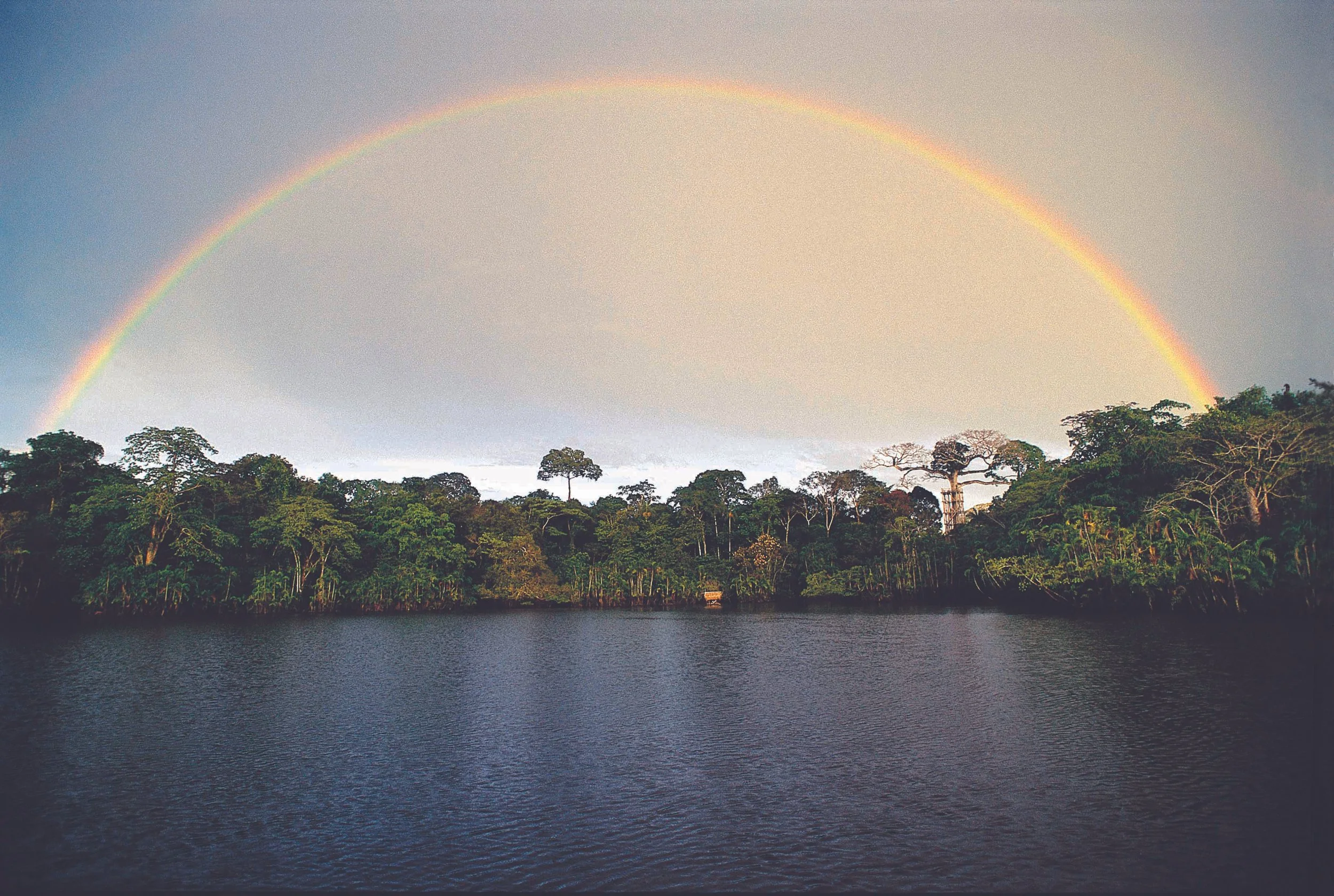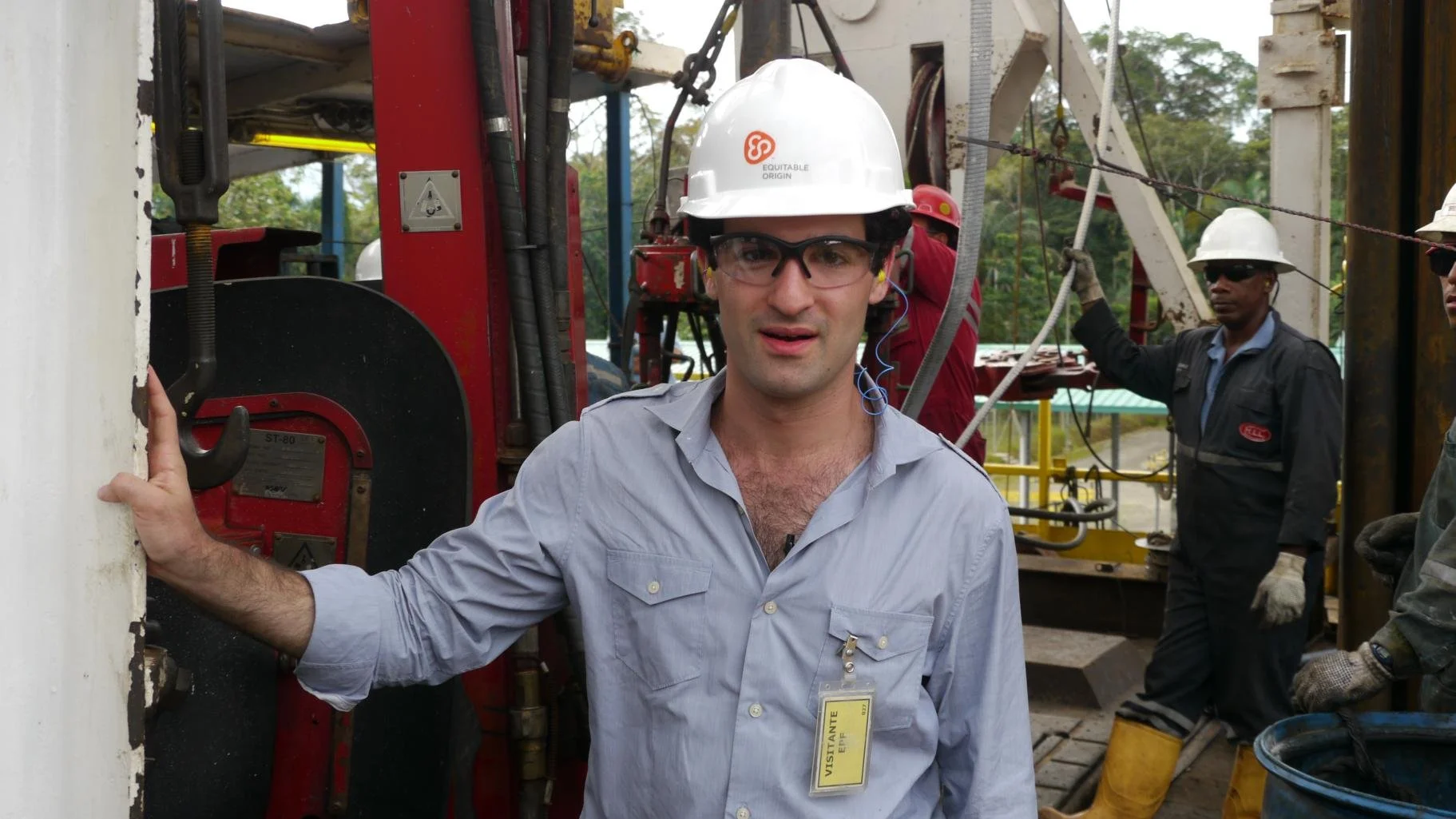
Equitable Origin works to reinforce Indigenous self-determination and achieve better outcomes from energy projects.
Equitable Origin was founded in 2009 by Manuel Pallares, an Ecuadorean biologist, and David Poritz, an innovator and Rhodes Scholar with a long-standing commitment to the communities of the region. Taking an entrepreneurial approach, they sought to advance Indigenous rights protections and more-accountable practices through voluntary market-based tools and standards.
“From a very young age, I was interested in the Amazon and …in high school worked with a group of lawyers seeking …to bring benefits to communities that had been affected by oil production in Ecuador. Through this experience, I was convinced of the need to develop good practice standards to address the social and environmental impacts of the sector”
– David Poritz, Equitable Origin Co-Founder
Their journey was the subject of an award-winning PBS documentary and National Geographic coverage. Since its birth in Ecuador 15 years ago, Equitable Origin has prioritized engaging and delivering benefits to stakeholders and Rightsholders, especially where impacts from Energy projects are felt the most.
The EO100™ Standard seeks to consolidate, through stakeholder and expert guidance, relevant global and sectoral commitments and benchmarks into quantifiable and auditable metrics at the level of an Energy Project. Comparable sustainability standards systems have been developed to improve outcomes and accountability in Hydropower, Biofuels, and Forestry.
EO100 is the foundation of the EO system. It was developed through a three-year, multi-stakeholder consultation process that was supported by a founder of the Forest Stewardship Council. Equitable Origin organized workshops in traditional formats and in local indigenous languages to introduce the concept of an independent certification system, to solicit advice on the design of the system, and to better understand the specific social and environmental concerns that communities, Rightsholders and experts had about energy development projects.
Between 2010 and 2012, EO held more than 70 workshops with local and indigenous communities affected by oil and gas exploration and production. Because of the decades of oil and gas development in Ecuador, many of these workshops were held in Ecuador's hydrocarbon regions, including Lago Agrio, Coca, Macas, Zamora, Puyo, Morona, Archidona and, Tena, as well as a regional workshop in Cumbayá in the vicinity of Quito that brought together Indigenous Peoples leaders of all the oil regions of Ecuador. We also conducted workshops with indigenous organizations in Peru, Colombia, Bolivia and Brazil.
This was followed by in-person consultations across Latin America, in Washington DC and in Europe, as well as online. This process collected and incorporated over 1,300 comments from communities and Indigenous Peoples’ organizations, industry, academia, development finance institutions, NGOs, and governments. The Standard was published in 2012, and in 2014, Equitable Origin issued the world’s first certification for socially and environmentally responsible oil production practices at the Pacific Rubiales Energy operations in Colombia.
Sector-specific supplements for Tight Oil and Shale Gas were developed in 2015-16. At this time, EO was also brought in to undertake a fact-finding effort on community-level opposition to wind power development, with a focus on community protest and project delays in Oaxaca, Mexico.
“The greatest constraint in moving large-scale projects, from conception to approval to first electron will not be financing, but the ability to earn and maintain social license and Free Prior and Informed Consent of project-affected Indigenous Peoples.”
- Jason Switzer, CEO, Equitable Origin
In 2017, following online consultation and under the guidance of an expert advisory committee, the EO100 Standard was extensively revised and reissued. In 2019, Seven Generations Energy Ltd. (7G, later acquired by ARC Resources) and Québec’s main natural gas distributor, Énergir s.e.c. established the first offtake agreement using EO certification as the basis for natural gas procurement.
In 2022, EO reviewed and reissued the Onshore Natural Gas and Light Oil Production supplement, and established supplements for Natural Gas Gathering/Boosting and Processing, and for Natural Gas Transmission & Storage. 2023 saw the launch of a new standard development process for Grid-scale Onshore Solar and Wind power projects, which were published in 2024.
Our Values
Do No Harm
Integrity
Continuous Improvement
Indigenous Self-Determination

Through the creation of our Standard, Equitable Origin identified that industry, government, and Indigenous leaders lacked the ability to demonstrate to other parties that free, prior, and informed consent was obtained in a just manner, whether for oil and gas, for renewable energy projects, or even for carbon offsets and development efforts.
There are limited resources designed specifically to support Rightsholders in activating their legal rights or to guide independent assessors in verifying whether good-faith efforts to advance toward FPIC have been followed. For project developers, prioritizing and effectively implementing FPIC mitigates significant reputational and operational risks and fosters stronger, more sustainable partnerships with Indigenous communities, leading to long-term value creation. With support from ISEAL, EO worked closely with Indigenous organizations in Latin America, such as CRIPX, RITA, COICA, FEPNASH, and CONFENAIE, to jointly define a process for assessing progress towards FPIC in a credible and transparent manner that respects the decision-making processes of Rightsholders.
As of 2021, only 4% of the remote Indigenous communities who live in the Ecuadorian and Peruvian Amazon had internet access.
Download the CEFO Connectivity Study
The emergence of new digital technologies and high-speed connectivity in remote locations has the potential either to reinforce divides and overwhelm traditional cultures, or to dramatically increase the opportunities for Indigenous empowerment, including economic opportunity, access to information, capacity for territorial monitoring, and mobilization of global and local support and alliances. This was brought to the fore during the COVID-19 pandemic, when Equitable Origin undertook a detailed study of connectivity and its links to development across Indigenous peoples within the Amazon region.
Since that time, Equitable Origin has formalized our work in Latin America to address this gap. Working with the Coordinator of Indigenous Organizations of the Amazon River Basin (COICA), CEFO seeks to preserve, promote and empower indigenous knowledge, communities and ways of life.
In 2023 we received an IEEE award for our approach to community-led connectivity, which allows Indigenous Peoples to better assert and safeguard their rights, and to preserve their lands, culture and history for future generations. EO’s certification system is intended to provide a sustainable source of revenues that can be reinvested to scale this model and support Indigenous Rights and Energy and Resource accountability across the Americas.







